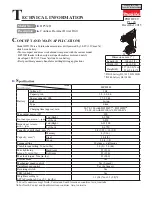
4
DANGER:
Electrocution hazard. Never attempt to open the battery pack for any
reason. If battery pack case is cracked or damaged, do not insert into charger. Do not
crush, drop or damage battery pack. Do not use a battery pack or charger that has
received a sharp blow, been dropped, run over or damaged in any way (i.e., pierced
with a nail, hit with a hammer, stepped on). Electric shock or electrocution may result.
Damaged battery packs should be returned to service center for recycling.
NOTE:
Battery storage and carrying caps are provided for use
whenever the battery is out of the tool or charger. Remove cap
before placing battery in charger or tool.
WARNING: Fire hazard. Do not store or carry battery so
that metal objects can contact exposed battery terminals.
For
example, do not place battery in aprons, pockets, tool boxes,
product kit boxes, drawers, etc., with loose nails, screws, keys, etc.
without battery cap.
Transporting batteries can possibly cause fires if the battery
terminals inadvertently come in contact with conductive materials such as keys,
coins, hand tools and the like.
The US Department of Transportation Hazardous
Material Regulations (HMR) actually prohibit transporting batteries in commerce or on
airplanes (i.e., packed in suitcases and carry-on luggage) UNLESS they are properly
protected from short circuits. So when transporting individual batteries, make sure
that the battery terminals are protected and well insulated from materials that could
contact them and cause a short circuit.
SPECIFIC SAFETY INSTRUCTIONS FOR NICKEL CADMIUM (NiCd) OR NICKEL
METAL HYDRIDE (NiMH)
• Do not incinerate the battery pack even if it is severely damaged or is
completely worn ou
t. The battery pack can explode in a fire.
• A small leakage of liquid from the battery pack cells may occur under extreme
usage or temperature conditions.
This does not indicate a failure.
However, if the outer seal is broken:
a. and the battery liquid gets on your skin, immediately wash with soap and
water for several minutes.
b. and the battery liquid gets into your eyes, flush them with clean water for a
minimum of 10 minutes and seek immediate medical attention. (
Medical note
:
The liquid is 25-35% solution of potassium hydroxide.)
• The label on your tool may include the following symbols. The symbols and their
definitions are as follows:
V ................. volts
A ...............amperes
Hz ............... hertz
W ..............watts
min ............. minutes
...........alternating current
.......... direct current
no ..............no load speed
.............. Class I Construction
.............earthing terminal
...................
(grounded)
.............safety alert symbol
............... Class II Construction
…/min .......revolutions per minute
...................
(double insulated)
BPM ..........beats per minute
Important Safety Instructions for All Battery Packs
When ordering replacement battery packs, be sure to include catalog number and
voltage. Consult the chart at the end of this manual for compatibility of chargers and
battery packs.
The battery pack is not fully charged out of the carton. Before using the battery pack
and charger, read the safety instructions below. Then follow charging procedures
outlined.
READ ALL INSTRUCTIONS
• Do not charge or use battery in explosive atmospheres, such as in the
presence of flammable liquids, gases or dust.
Inserting or removing the battery
from the charger may ignite the dust or fumes.
• Never force battery pack into charger. Do not modify battery pack in any
way to fit into a non-compatible charger as battery pack may rupture
causing serious personal injury
. Consult the chart at the end of this manual for
compatibility of batteries and chargers.
• Charge the battery packs only in D
E
WALT chargers.
•
DO NOT
splash or immerse in water or other liquids.
• Do not store or use the tool and battery pack in locations where the
temperature may reach or exceed 40
˚
C (105°F) (such as outside sheds or
metal buildings in summer).


































